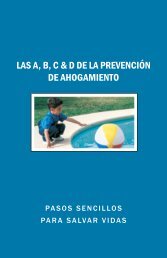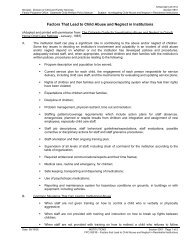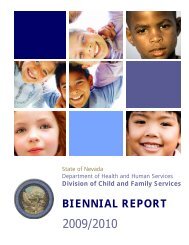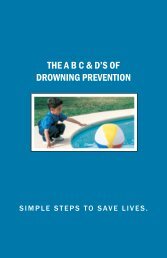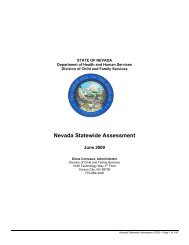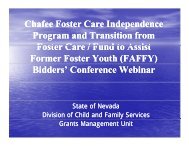STATE OF NEVADA - Division of Child and Family Services
STATE OF NEVADA - Division of Child and Family Services
STATE OF NEVADA - Division of Child and Family Services
Create successful ePaper yourself
Turn your PDF publications into a flip-book with our unique Google optimized e-Paper software.
Figure 16: Percentage <strong>of</strong> Foster <strong>and</strong> Adoptive Parents Receiving Basic Training in SFY 2010<br />
Percentage <strong>of</strong> Foster <strong>and</strong> Adoptive Parents Receiving Basic Training in SFY 2010<br />
DCFS - Rural Region<br />
32%<br />
Clark County<br />
51%<br />
Washoe County<br />
17%<br />
Source: <strong>Child</strong> Welfare Agency Reports for July 1, 2009 - May 31, 2010<br />
The agencies initiated several projects over the past year related to foster <strong>and</strong> adoptive parent training <strong>and</strong> collaboration<br />
with external agencies has improved training opportunities. For example, WCDSS is beginning to utilize youth who have<br />
aged out <strong>of</strong> the system to assist in training new foster parents <strong>and</strong> foster parent co-trainers. In addition, they are working<br />
collaboratively with community members to provide advanced foster parent trainings in the areas <strong>of</strong> substance abuse,<br />
child development, age specific issues in parenting, providing training in English <strong>and</strong> Spanish where available, <strong>and</strong><br />
additional disability specific coursework. The DCFS – Rural Region has also been able to increase the number <strong>of</strong><br />
licensed foster homes in the rural areas through a IV-B subgrant with the Sierra Association <strong>of</strong> Foster Families (SAFF).<br />
SAFF instructors provide initial PRIDE training <strong>of</strong> foster <strong>and</strong> adoptive families. CCDFS has also held a wide variety <strong>of</strong><br />
advanced trainings, but these have been mostly <strong>of</strong>fered through their in-house training unit. Table 37 shows the total<br />
number <strong>of</strong> trainings <strong>of</strong>fered by topic followed by the number <strong>of</strong> participants who have taken the course over the past year.<br />
Other initiatives include Clark County’s focus on implementing a field training team <strong>and</strong> preparation <strong>of</strong> a comprehensive<br />
agency training plan <strong>and</strong> Washoe County’s caregiver newsletter. The Clark County Training Plan includes Staff<br />
Development Training, Field Training, Advanced Caregiver Training, Parenting Project Training <strong>and</strong> PS-MAPP Foster<br />
Parent Training. A particular strength <strong>of</strong> this process is that it builds on the system that was implemented in 2007. As the<br />
training team members are integrated into the CCDFS system, they are aware <strong>of</strong> the strengths <strong>and</strong> weaknesses in the<br />
system. Each member <strong>of</strong> the training team possesses specific knowledge from curriculum development to past field (CPS<br />
<strong>and</strong> Permanency) experience. The ability <strong>of</strong> CCDFS trainers to meet the needs <strong>of</strong> foster parents <strong>and</strong> staff is evident in<br />
the number <strong>of</strong> trainings <strong>of</strong>fered in the past fiscal year. WCDSS also provides its foster parents with a newsletter every two<br />
months which provides information about social service issues that impact foster families <strong>and</strong> training tips, as well as<br />
featuring children waiting for adoption or who need concurrent families. Flyers are also mailed each time <strong>and</strong> advanced<br />
training is available.<br />
The child welfare agencies experience some challenges regarding training. For example, WCDSS has found that<br />
providing training on specialized care, such as specific high medical needs can be limiting. They find that it is also difficult<br />
to ensure proper screening through the training <strong>and</strong> licensure process to assist individuals <strong>and</strong> families that find out late in<br />
the process that fostering is not a good fit for them. CCDFS has found challenges due to budget constraints. Despite the<br />
success in implementing the Field Training Unit, this unit was dissolved in May 2010 due to lack <strong>of</strong> available funds <strong>and</strong><br />
new hires. CCDFS has been unable to hire new people due to a hiring freeze since August 2008.<br />
Nevada APSR – SFY 2010<br />
Page 58 <strong>of</strong> 108





